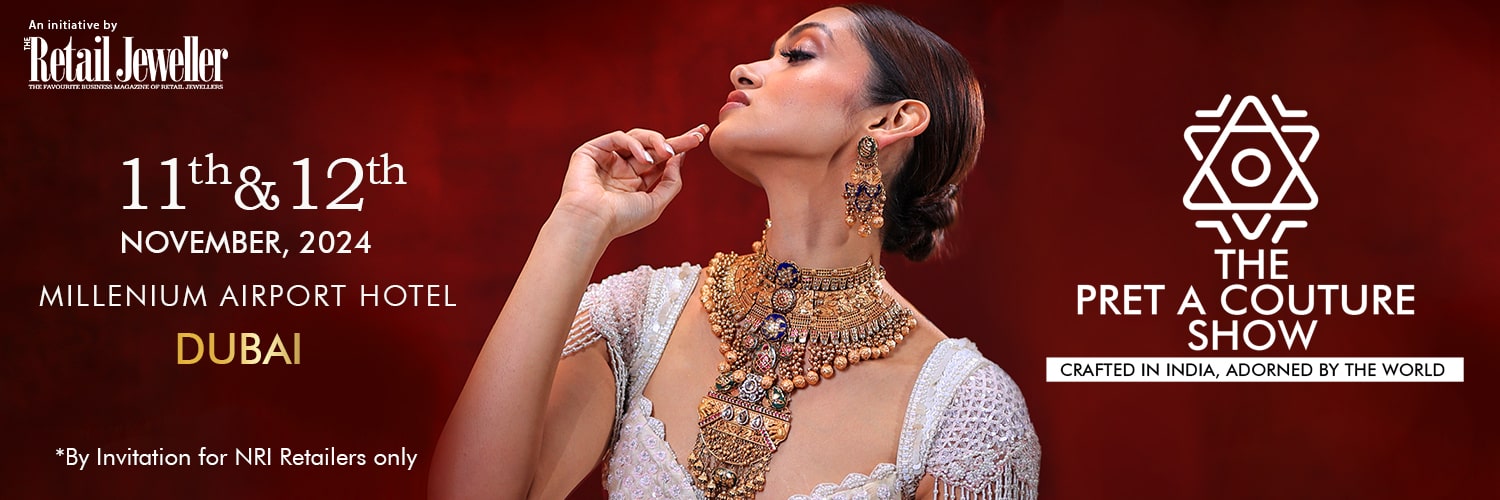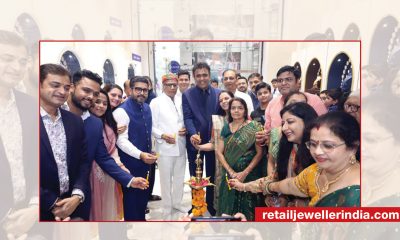Forum 2023
Jeweller-to-jeweller collaborations and franchising can be game-changer for the jewellery retail business

New collaboration possibilities, where jewellers can work together towards shared goals and emerging growth opportunities through franchising, was the topic of a discussion by a panel of experts from the gems and jewellery sector at the recently held Retail Jeweller India Forum 2023.
Devang Shah, VP of Digital and E-Commerce at Gabriel and Company, who moderated the discussion, highlighted three critical models of partnerships, including franchising, shop-in-shop and licensing. “The latter is uncommon in India, requiring handling the operations completely,” he said. He discussed the opportunity for jewellers to take licensing rights for international brands to operate in India.
The panel discussed the common apprehensions about such models. At the franchisor’s end, they were questions such as how the brand interacts with its current business, the investments required, and the margins remain common. At the brand’s end, they were worries about compatibility and the financial muscle of the partner.

Parag Shah, Director of KISNA Diamond Jewellery, gave insights into building the most prominent brand through the distributorship model over the last 18 years. He explained how the brand identified the critical pain points of the category and created value for partners by offering certified diamond jewellery in 2005 and goods in less than 48 hours. In turn, it introduced the practice of advance payments in outright business when the industry was familiar with only consignment models.The brand started expanding through the franchisee model very recently. “Both are completely different. We started three franchise stores and have plans for more than 20 franchise stores,” he explained.

Talking about design partnerships for the brand Farah Khan Atelier, which is present across 10 stores in America, and a few franchisees and shop-in-shop models across India, Farah Khan, Creative Director & Founder, Farah Khan Fine Jewellery, said, “The youth want to buy brands that exhibit their culture and aesthetics, and that is where a brand like ours offering affordable high-end designs becomes relevant.”
Designers create products with powerful narratives, while a retailer is a conduit for selling that story to customers. The brand offers differential pricing in the US and India markets, said Khan. “In India, we are selling these high-quality products at a much lower price as it is a price-sensitive market. Collaborating between an Indian jeweller and a designer brand like mine will only be a win-win for both,” she explained. She added that brands enable higher profitability for retailers; while selling a designer label, the jeweller can move the discussion away from material usage as the design value is more pronounced.

Nitin Jain, Business Head- Accessories and Non-Apps, Reliance Retail gave a perspective on how the company identifies potential brand partners: “We always keep the consumer at the heart of any decision. If it only has the right fit for the customer, it will make a profit,” he said.
Jain further explained, “A retailer has an established format based on which the customer has a certain idea of what she can expect at the store regarding her budget and choice. The key is to ensure the brand provides a product that fits that matrix.”
The panel concurred that the collaboration could be a win-win if the partner brand can offer the retailer equivalent (to existing) return per sqft over a sustained period.

Addressing the moot issue, Colin Shah, Managing Director at Kama Jewellery Pvt. Ltd., urged retailers to look at stronger partnerships where retailers and manufacturers can make healthy profits. “The retailer must not worry about the margins a manufacturer is earning,” he stated.

The panel discussed the opportunities in the lab-grown diamonds segment and how it can quickly fill the vast untapped diamond market. Talking about the need for partnerships, especially in the lab-grown space, where a diamond retailer often worries about diluting its brand equity, Saumitra Patwardhan of LabGlow by Star Blue said, “The brand takes much pressure off individual retailers who will think about how the category may impact its goodwill.”

Taking the discussion forward, Lunica Desai, Marketing Head at One Glass Shoe, a B2B lab-grown brand, talked about how brands use their expertise to educate the retailer and the sales staff so that they can speak the correct language and increase conversions.
Concluding the panel, Shah quizzed Jain on how a behemoth like Reliance cherry-picks from an extensive roster of brands. “We never make a choice for the customer in retail, and it is more accurate for online platforms where this choice becomes easy as we can evaluate what customers are viewing, and based on that, those brands start coming up,” Jain explained.
RJ India





 Wide Angle1 month ago
Wide Angle1 month agoIndia has overtaken China to become second largest diamond market: De Beers CEO Al Cook

 Daily News1 month ago
Daily News1 month agoUS-based private equity firm Advent International to acquire Orra Fine Jewellery, say media reports

 Wide Angle1 month ago
Wide Angle1 month agoEminent jeweller Viren Bhagat sets up first global boutique in London’s Mayfair

 Daily News1 month ago
Daily News1 month agoLimelight Lab Grown Diamonds secures $ 11 million in funding to fuel its retail growth























